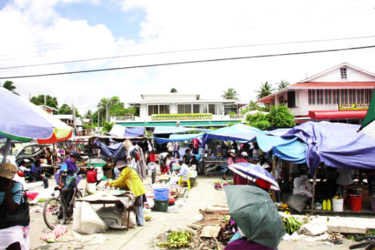By Karen Abrams, MBA Co-Founder, STEMGuyana
I have a particular sensitivity, to street vendors. My feelings are deep and go back to a time even before my teen years. I grew up in Socialist Guyana and I remember as a child of twelve years old, having a burning desire to be financially independent. I hated asking my parents for money, and I desperately wanted, even at twelve years old, to control my own income. My source of income as a twelve year old growing up in Socialist Guyana was selling the ‘fancy’ clothes and toiletries my mother sent for me from the United States. It was a very easy choice for me to forego the ‘nice clothes’ for a constant stream of income. My family never knew.
While my siblings planned to sport their new garb, I planned the quickest way to sell the merchandise. I remember routinely gathering up all of the toiletries and clothing allocated to me, and then marching down to ‘Vendor’s Arcade’ to sell them to my favourite vendor. I’m not going to reveal the name of the vendor, but he was a legend in my community, a person who supported many youth activities. In addition, it was obvious to my twelve-year-old eyes that all the people I knew who were ‘sellers’ seemed to be the most financially comfortable. That was the space I sought for myself.

I have vivid memories of this vendor greeting me professionally. He’d asked me where I got my supplies and I told him from my mom who lived overseas. He was always professional and fair, he negotiated with me like I was an adult, we would make a fair exchange and I would walk away a ‘wealthy’ pre-teen, oh how I loved those days.
To be clear, although the Guyanese economy was in recession, and foreign exchange in short supply; I didn’t really ‘need’ to sell these items. My dad provided for us comfortably and both of my older siblings worked. I remember vividly that during that period in Guyana, vendors and traders offered a lifeline to most Guyanese. I know of many millionaires who were created during those times. Many of them moved into ‘high class’ neighbourhoods, expanded and became wealthy retailers and business people. Many of them are still in business today and almost all of them were able to afford their own children a decent living and a quality education.
The angst we experience in Guyana over street vendors is by no means unique, many major cities around the world struggle to find a way to balance the vibrant marketplaces and revenue generating engines of street vending with the pressure from traditional retailers, the perceived negative aesthetics and the inaccurate accounting of the social and financial costs of maintaining a vibrant street vending sector. Some nations do it much better than others. In the city of Los Angeles, CA for example, street vending is for the most part illegal, yet “street trade makes up a hefty slice of the city’s economy.

According to an Economic Roundtable report, expenditures by an estimated 50,000 street vendors generate US$517 million in economic stimulus, four-fifths of it in the local economy, and an estimated 5,234 sustained jobs have been created to meet the demand of vendors and their purchasing activities.” However there is a constant challenge by retailers whose prices are higher because they pay overhead like rent, electricity and taxes. This must be balanced though, against vendors dealing with aggressive competition, poverty, adverse weather conditions, poor location and a constant worry about law enforcement. The push to legalize street vending continues with organizations like LA Street Vending Campaign pushing to formalize these informal workers to give them the right to work. “We want to provide economic development for low-income communities that can really benefit from the income that would be coming from street vending.” The city of LA is very much aware of the value of street vending, which is why enforcement is mostly token and ‘illegal vending’ continues for more than 30 years.
Here in Guyana, we must be cognizant of the effects of disrupting the entire supply chain when vendors are not allowed to trade. Additionally, in a country where forty percent of the population is unemployed and where entrepreneurship is encouraged, street vending seems like a perfect answer to two pressing issues. In analyzing street vending in Guyana, one must consider the years of investment many vendors have made in plying their trade.
My own mother, who is eighty years old, often regales me with tales of selling for Auntie Gertie in the market as a little girl in Guyana, circa 1946. After school, she would hustle over to the market to help Auntie Gertie at her stall. Auntie Gertie would then pay her a little ‘small piece’ to her utter joy. Today Auntie Gertie’s grandson owns a large supermarket store in Guyana.
The issue of the vendor’s supply chain is a critical part of the conversation on vending. Vendors purchase from wholesalers, who purchase from farmers. Vendors pay city hall various fees, which are clearly needed by a city that continues to struggle financially. Vendors, wholesalers and farmers pay some entity for transportation of goods and services; all of these stakeholders pay their local help. When sales are generated, all stakeholders purchase food, clothing and pay mortgages with those proceeds. Many of them reinvest to expand product lines, purchase equipment or expand their operations. Often, vending stands between street vendors and poverty.
There are children to feed, uniforms and school supplies to purchase, and school transportation costs to pay. One must also consider that the cost of vending disruption includes children not sent to school because of no money for lunch or no transportation to get there. There is no easy way to recoup, days of school missed. The actual costs of a disruption in vending in Guyana are actually in the hundreds of millions of dollars.
To be fair, we must also balance the issues identified by our City Hall. Crime in the marketplace has been identified as an issue, in addition to unclean surroundings. The issues identified by City Hall are valid but they must be addressed in an organized, systemic and humane manner. It is also important that all stakeholders be aware of the potentially devastating financial effects on the nation’s economy when vending is disrupted.
Vendors are one important component of a critical chain of stakeholders who all depend on the success of those vendors for their livelihood.
So if crime is the problem, then let’s engage the experts and solve the crime problem. If trash management is the problem, let’s make sure that there is a clearly identified place for vendors to dump and that trash collection is frequent and efficient enough to manage the trash generated.
Let us find an acceptable place for vendors before we move them. Let us communicate and collaborate in order to minimize disruption to the economy while still achieving the very important goals of City Hall. Let us all recognize that vendors are a critical part of our economy.





